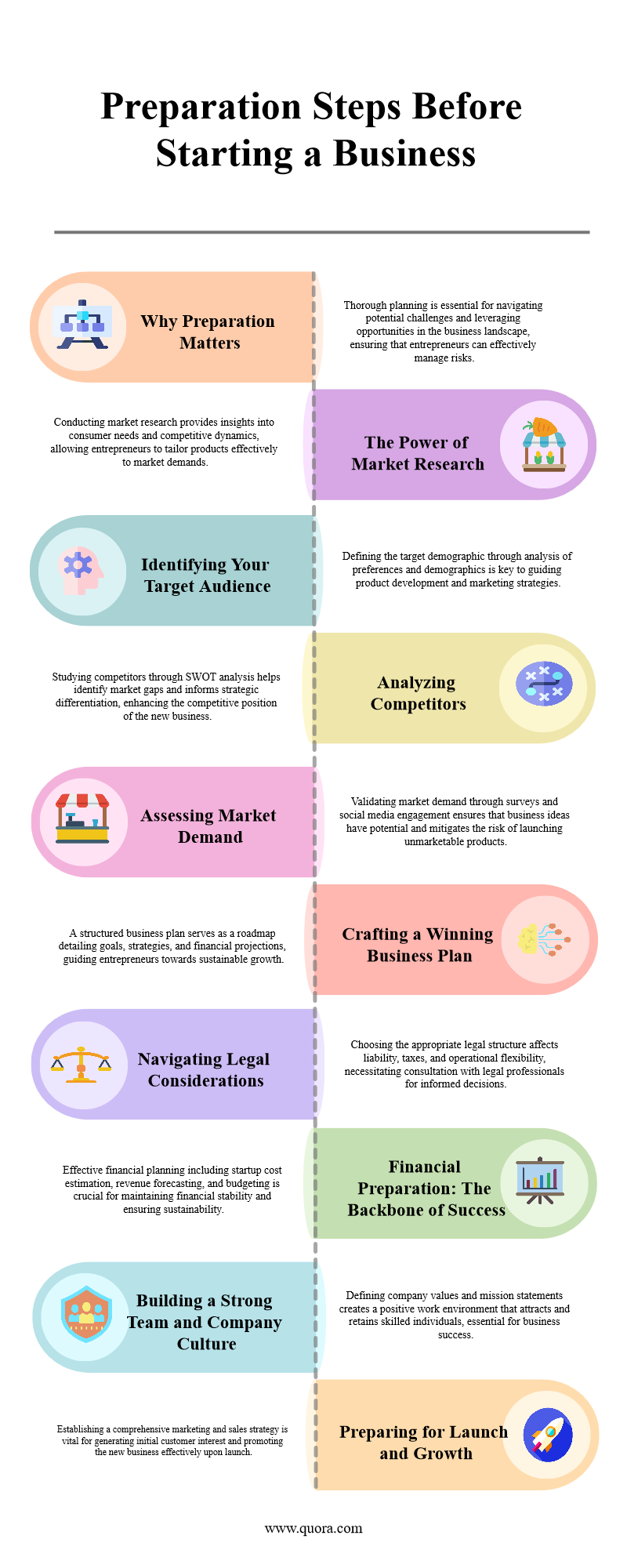Unlocking Entrepreneurial Success: Your Ultimate Pre-Launch Checklist
 Daniel Parente
Daniel ParenteTable of contents
- Key Takeaways
- Why Preparation Matters
- The Power of Market Research
- Crafting a Winning Business Plan
- Components of a Business Plan
- Navigating Legal Considerations
- Choosing a Business Structure
- Registering Your Business
- Obtaining Necessary Licenses and Permits
- Financial Preparation: The Backbone of Success
- Estimating Startup Costs
- Forecasting Revenues
- Creating a Budget
- Securing Funding
- Building a Strong Team and Company Culture
- Hiring Key Team Members
- Fostering Collaboration and Innovation
- Testing and Validating Your Business Idea
- Gathering Feedback
- Iterating on Your Offering
- Preparing for Launch and Growth
- Establishing a Marketing Strategy
- Developing a Sales Plan
- Setting Up Operations
- Case Studies: Lessons from Successful Entrepreneurs
- Airbnb: Disrupting the Hospitality Industry
- Spanx: Solving a Common Problem
- Tesla: Innovating the Automotive Industry
- Common Pitfalls to Avoid
- Inadequate Market Research
- Poor Financial Planning
- Ignoring Legal Requirements
- Neglecting Customer Feedback
- Resources for Aspiring Entrepreneurs
- Online Communities and Forums
- Business Planning Tools
- Legal and Financial Guides
- Networking and Mentorship
- Related References
- Conclusion

Embarking on an entrepreneurial journey is both exhilarating and challenging. Before diving headfirst into starting a business, meticulous planning and preparation are crucial. This comprehensive guide outlines essential steps aspiring entrepreneurs should undertake to lay a solid foundation for success. From market research to financial planning, we’ve got you covered!
Key Takeaways
Conduct thorough market research to understand your target audience and competitors.
Develop a comprehensive business plan outlining your goals, strategies, and financial projections.
Choose the right legal structure for your business to protect personal assets and optimize taxes.
Register your business and obtain necessary licenses to operate legally.
Create a detailed financial plan to manage startup costs and forecast revenues.

Why Preparation Matters
Launching a business without adequate preparation is akin to navigating uncharted waters without a compass. Thorough planning helps identify potential challenges, mitigate risks, and capitalize on opportunities. It ensures that entrepreneurs are well-equipped to face the dynamic business landscape.

The Power of Market Research
Understanding your market is the cornerstone of a successful business. Market research provides valuable insights into consumer needs, competitive dynamics, and industry trends. By analyzing this data, entrepreneurs can tailor their offerings to meet market demands effectively.

Identifying Your Target Audience
Knowing who your customers are is paramount. Define your target demographic by analyzing factors such as age, location, and preferences. This information guides product development and marketing strategies, ensuring they resonate with your audience. Utilize tools like Google Trends and SEMrush for data-driven insights.
Analyzing Competitors
Studying your competitors helps identify gaps in the market that your business can fill. Conduct a SWOT analysis (Strengths, Weaknesses, Opportunities, Threats) to assess your competitive position. This analysis informs your strategy and differentiates your offerings from existing players.
Assessing Market Demand
Gauge interest in your product or service through surveys, social media engagement, and focus groups. Validating market demand ensures that your business idea has potential and reduces the risk of launching a product that fails to attract customers.

Crafting a Winning Business Plan
A well-structured business plan serves as a roadmap for your entrepreneurial journey. It outlines your business goals, strategies, and financial projections, providing a clear direction for growth.
Components of a Business Plan
Executive Summary: A brief overview of your business concept and objectives.
Company Description: Detailed information about your business, mission, and vision.
Market Analysis: Insights into your industry, target market, and competitive landscape.
Organization and Management: Structure of your business and key team members.
Service or Product Line: Description of your offerings and their unique value proposition.
Marketing and Sales: Strategies for promoting your business and generating revenue.
Funding Request: Financial needs and funding requirements.
Financial Projections: Estimates of revenue, expenses, and profitability.
Utilize resources like SCORE and Bplans for business plan templates and guides.

Navigating Legal Considerations
Choosing the right legal structure for your business is crucial. It affects your liability, tax obligations, and operational flexibility. Common structures include sole proprietorships, partnerships, limited liability companies (LLCs), and corporations.

Choosing a Business Structure
Structure Type Description Pros Cons Sole Proprietorship Owned by one person Simple to set up, full control Unlimited personal liability Partnership Owned by two or more people Shared financial commitment Joint liability, potential disagreements Limited Liability Company (LLC) Hybrid structure combining elements of partnerships and corporations Limited liability, flexible taxation More complex to set up Corporation Separate legal entity Limited liability, easier to raise capital More regulations and taxes
Consult with a legal professional to determine the best structure for your business needs.
Registering Your Business
Once you’ve chosen a name and structure, register your business with the appropriate government authorities. This includes obtaining an Employer Identification Number (EIN) from the IRS for tax purposes and any necessary state and local licenses.
Obtaining Necessary Licenses and Permits
Depending on your industry and location, you may need various licenses and permits to operate legally. Research and acquire these documents to avoid legal complications. Resources like the U.S. Small Business Administration (SBA) provide guidance on licensing requirements.

Financial Preparation: The Backbone of Success
Financial planning is essential for managing your business’s finances effectively. It involves estimating startup costs, forecasting revenues, and creating a budget to ensure financial stability.

Estimating Startup Costs
Calculate the initial expenses required to launch your business. This includes costs for equipment, inventory, marketing, and operational setup. Utilize tools like Investopedia’s Startup Cost Calculator to estimate your financial needs accurately.
Forecasting Revenues
Project your business’s revenue based on market research and pricing strategies. This forecast helps in planning for growth and ensuring financial sustainability. Use financial software like QuickBooks for accurate projections.
Creating a Budget
Develop a detailed budget outlining your expected income and expenses. This financial plan ensures that you allocate resources effectively and maintain cash flow. Include contingency funds for unexpected expenses to mitigate risks.
Securing Funding
Determine how much capital you need to start your business and explore funding options. These may include personal savings, loans, investors, or crowdfunding. Prepare a compelling pitch and financial documents to attract potential investors.

Building a Strong Team and Company Culture
A successful business relies on a skilled and motivated team. Define your company values and mission statement to foster a positive work environment. Develop an organizational structure and job descriptions to attract and retain talented individuals.
Hiring Key Team Members
Identify the key roles necessary for your business operations. Create detailed job descriptions and hiring criteria to attract qualified candidates. Utilize platforms like LinkedIn for recruiting and networking.
Fostering Collaboration and Innovation
Encourage a culture of collaboration and continuous learning within your team. Foster innovation by promoting open communication and idea-sharing. This approach drives creativity and enhances problem-solving capabilities.

Testing and Validating Your Business Idea
Before launching, test your business idea to gather feedback and make necessary adjustments. Develop a minimum viable product (MVP) to validate your concept with potential customers. Utilize tools like SurveyMonkey for collecting and analyzing feedback.
Gathering Feedback
Conduct surveys, focus groups, and beta tests to gather insights from your target audience. Analyze this feedback to refine your product or service and ensure it meets market demands.
Iterating on Your Offering
Based on customer feedback, iterate on your product or service to improve its features and functionality. This iterative process ensures that your offering evolves with market needs and remains competitive.
Preparing for Launch and Growth
As you approach your launch date, prepare a comprehensive marketing and sales strategy. Develop a launch plan outlining promotional activities and events to generate buzz and attract initial customers.
Establishing a Marketing Strategy
Create a marketing plan that includes digital marketing, SEO, content marketing, and social media strategies. Utilize platforms like HubSpot for marketing automation and analytics.
Developing a Sales Plan
Outline your sales strategy, including target markets, sales channels, and revenue projections. Implement a customer relationship management (CRM) system to manage sales processes and customer interactions effectively.
Setting Up Operations
Establish systems and infrastructure for your business operations. This includes setting up a physical location (if needed), implementing IT infrastructure, and developing operational processes.
Case Studies: Lessons from Successful Entrepreneurs
Learning from the experiences of successful entrepreneurs provides valuable insights into the challenges and opportunities of starting a business. Here are some inspiring case studies:
Airbnb: Disrupting the Hospitality Industry
Airbnb revolutionized the hospitality industry by connecting travelers with local hosts offering unique accommodations. The founders identified a gap in the market for affordable and authentic travel experiences. Through persistent market validation and iterative development, they built a global platform that disrupted traditional hotel models.
Spanx: Solving a Common Problem
Sara Blakely, the founder of Spanx, identified a common problem faced by women — the lack of comfortable and effective shapewear. By creating a product that addressed this need, she built a billion-dollar empire. Her success story highlights the importance of understanding your target audience and delivering a solution that meets their needs.
Tesla: Innovating the Automotive Industry
Elon Musk’s vision for Tesla was to accelerate the world’s transition to sustainable energy. By focusing on innovation and disruptive technology, Tesla challenged the status quo of the automotive industry. The company’s success demonstrates the power of a strong mission and relentless pursuit of innovation.

Common Pitfalls to Avoid
While preparing to launch your business, be aware of common pitfalls that can hinder your success. Here are some mistakes to avoid:
Inadequate Market Research
Failing to conduct thorough market research can lead to launching a product or service that doesn’t meet market demands. Invest time and resources in understanding your target audience and competitive landscape to validate your business idea.
Poor Financial Planning
Inadequate financial planning can result in cash flow issues and financial instability. Develop a detailed financial plan that includes startup costs, revenue projections, and budgeting to ensure financial sustainability.
Ignoring Legal Requirements
Overlooking legal requirements can lead to costly penalties and legal complications. Research and comply with all necessary licenses, permits, and regulations to operate your business legally.
Neglecting Customer Feedback
Ignoring customer feedback can hinder your ability to improve your offerings and meet market demands. Actively seek and analyze feedback to refine your product or service and enhance customer satisfaction.

Resources for Aspiring Entrepreneurs
Utilize the following resources to gain knowledge, seek advice, and connect with other entrepreneurs:
Online Communities and Forums
Reddit’s Entrepreneur Community: A vibrant community where entrepreneurs share experiences, seek advice, and discuss business strategies.
Quora’s Entrepreneurship Topic: A platform for asking questions, sharing knowledge, and gaining insights from experienced entrepreneurs.
Business Planning Tools
SCORE’s Business Plan Template: A comprehensive template for creating a detailed business plan.
Bplans: A resource for business plan samples, templates, and guides.
Legal and Financial Guides
U.S. Small Business Administration (SBA): Provides guidance on legal requirements, financial planning, and business management.
Investopedia: Offers articles, tools, and resources for financial planning and investment strategies.
Networking and Mentorship
LinkedIn: A professional networking platform for connecting with industry experts, mentors, and potential partners.
SCORE Mentors: A network of volunteer mentors offering free business advice and support.
Related References
8 Things You MUST Do BEFORE Launching Your Business | Admin Tasks to Start Strong
Avoid These MISTAKES BEFORE Starting an LLC!
48 seconds on creating a business!
Infography

Conclusion
Starting a business is a multifaceted journey that requires thorough preparation and planning. By conducting market research, developing a comprehensive business plan, navigating legal considerations, and securing funding, aspiring entrepreneurs can lay a solid foundation for success. Utilize the resources and insights provided in this guide to embark on your entrepreneurial journey with confidence and determination.
Remember, the path to entrepreneurship is filled with challenges and opportunities. Stay resilient, adaptable, and focused on your goals. With the right preparation and mindset, you can transform your business idea into a thriving venture.
Good luck on your entrepreneurial journey! 🚀
For further reading and resources, explore the following links:
The Hartford: How to Start a Business From Scratch in 7 Steps
U.S. Small Business Administration: 10 Steps to Start Your Business
Disclaimer: The information provided in this guide is for educational purposes only. Always consult with legal, financial, and business professionals for advice tailored to your specific situation.
Subscribe to my newsletter
Read articles from Daniel Parente directly inside your inbox. Subscribe to the newsletter, and don't miss out.
Written by
